The personal essay has long been a staple — and a reader-favorite section — here at Salon. Some offer individual insights into newsworthy moments and our current zeitgeist, while others explore evergreen human concerns about family, relationships, community, identity and even eternity. Here, from 10 talented writers — including two from Salon's own staff — are the personal essays published this year that were most popular with our readers.
"I grew up in the Satanic Panic — and it's happening again" by Gigi Griffis
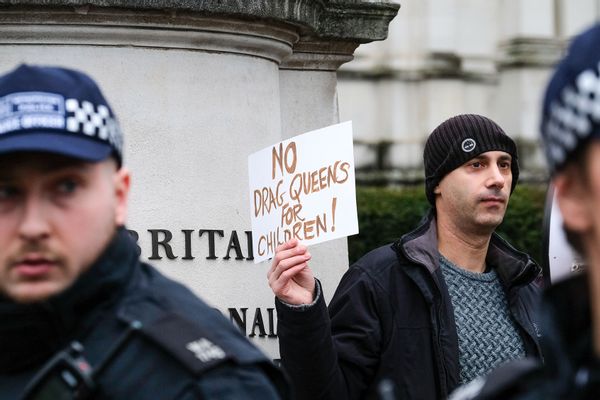 Anti-fascists and members of Stand Up To Racism demonstrate against the Patriotic Alternative protest at the Tate Britain, Drag Queen Story Hour UK events at the gallery. (Matthew Chattle/Future Publishing via Getty Images)
Anti-fascists and members of Stand Up To Racism demonstrate against the Patriotic Alternative protest at the Tate Britain, Drag Queen Story Hour UK events at the gallery. (Matthew Chattle/Future Publishing via Getty Images)I was a young teen when I destroyed my music collection in the name of Jesus.
I stood in the cul-de-sac with my best friend, Joanna, and we smashed our CDs to smithereens on the hot, hard asphalt. Scratched and snapped and broken into pieces, these secular musicians would never again whisper their ungodly thoughts into our young, impressionable ears—a thing we had been convinced, in church and youth group and summer revivals, would tempt us slowly away from our god. Read the essay by Gigi Griffis.
"The holy maple bar: Notes on an afterlife, without religion" by Keegan Lawler
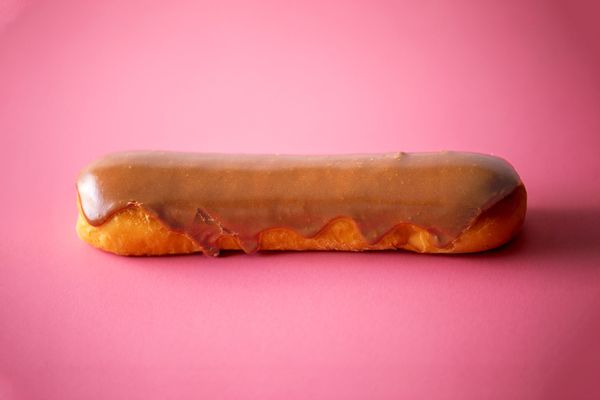 Maple Bar Donut (Getty Images/Garrett Aitken)
Maple Bar Donut (Getty Images/Garrett Aitken)After the dead lizards have been plucked out by the long-necked net, my aunt and I take seats in the reclining plastic chairs next to the pool outside her house. It is the last week in June and my time in Starkville, Mississippi, has taught me the true definition of heat, the heavy weight of humidity.
My cousins slice through the dampness hanging in the air and rush toward the pool. The oldest, his eyes towards the sky, asks my aunt if there will be rain. She tells him maybe, and that if so, she'll have to bring them inside. Read the essay by Keegan Lawler.
"A love affair in life's last act" by Alice Bingham Gorman
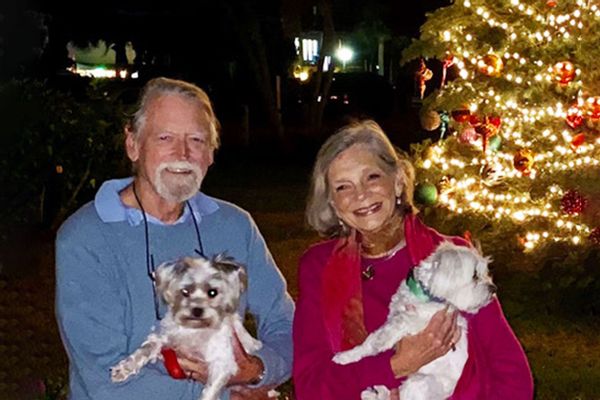 Author Alice Bingham Gorman and her partner together for Christmas (Photo courtesy of author)
Author Alice Bingham Gorman and her partner together for Christmas (Photo courtesy of author)What are the chances of a woman in her 80s finding a man to share her life — not just a companion, as pleasant as that would be, but real physical, mental and emotional love? Throughout the 16 years after my last husband died, I asked myself that question a thousand times. I knew the grim statistics. Harvard Health Publishing says that by age 85, 67% of the American population is female. Adding to the skewed odds, so few of the male population left standing are interested in women over a certain age. The likely ones, the men who have had good love relationships and desire another, do not seem to remain alone for more than a few months, if that long. A friend suggested to me that the best chance for a woman in her 70s or 80s to appeal to a good man would be through a meaningful friendship with a couple before his wife passes away. It never occurred to me that such a situation would ever happen to me. Read the essay by Alice Bingham Gorman.
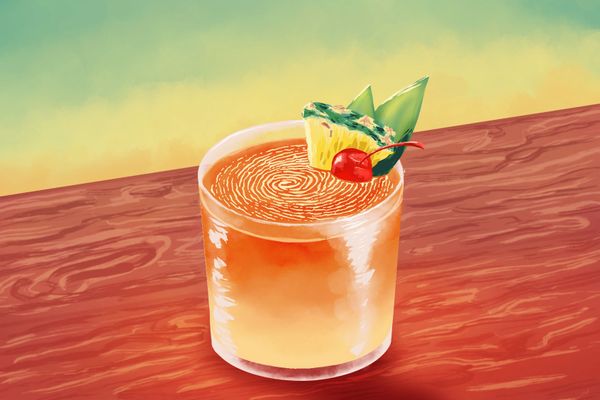 D's Mai Tai Mocktail (Illustration by Ilana Lidagoster/Salon)
D's Mai Tai Mocktail (Illustration by Ilana Lidagoster/Salon)“You’ll be OK. I take breaks, on and off, all of the time,” my cousin Maja said with a smooth smile during my first week off alcohol. “And if you want that feeling, pull up on me. I'll whip up something special for you. A mocktail.”
Maja is my first cousin’s first cousin. In Baltimore, that means we’re close family. My dad's sister married her dad's brother, ultimately connecting us. A popular bartender, Maja created the most beautiful drinks anyone has ever seen or tasted in some of Baltimore’s fanciest restaurants.
“A MajTail,” I laughed, sipping the ginger-heavy citrus concoction she slid in my direction. “I’m in it for the long haul, cuz.” Read the essay by D. Watkins.
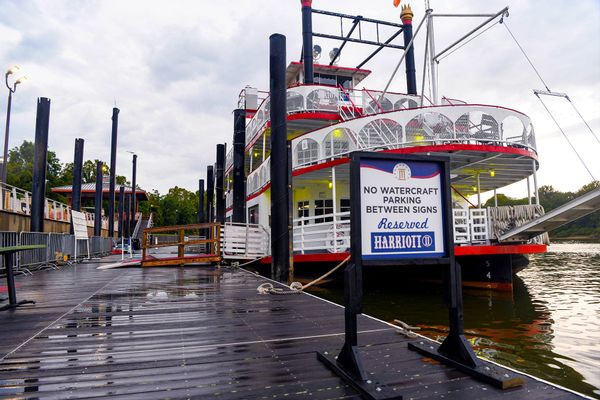 The Harriott II, a riverboat, remains docked on August 8, 2023, on the Alabama riverfront in downtown Montgomery, Alabama. (Julie Bennett/Getty Images)
The Harriott II, a riverboat, remains docked on August 8, 2023, on the Alabama riverfront in downtown Montgomery, Alabama. (Julie Bennett/Getty Images)As a Native Son of Alabama, I would like to pull back the veil that surrounds the Black experience and provide insight into why the event that has been dubbed the Alabama Sweet Tea Party is my own personal flashpoint in Alabama history.
For context, it was not until I entered Howard University in Washington, D.C., coming from Birmingham, Alabama, that I first became aware of the misconceptions, and ultimately the stereotypes, about me from being born in a city known for dog bites and dynamite blasts, for killing four little girls and critically wounding another on Sunday morning in a house of worship, a day of dedicated peace and spirituality. Even at Howard, that great mecca of higher learning, there was always a formulaic assumption about Black Southerners: that we were countrified hicks, docile, unaware of the social constructs that bind us to a way of living, incapable of resistance — our drawl, the way we said mane and gull instead of man and girl, made us different, a sorta sideshow, an oddity within the fabric of Blackness. Read the essay by Randall Horton.
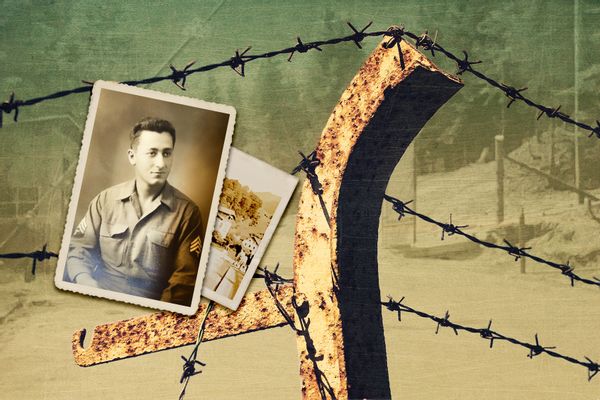 WW2 army portrait of Merrill Stern (Photo illustration by Salon/Photos courtesy of the Rozsa Family/Getty Images)
WW2 army portrait of Merrill Stern (Photo illustration by Salon/Photos courtesy of the Rozsa Family/Getty Images)The last time I saw my great-uncle, he uttered six words that I will never forget. Struggling to speak, as he was already 102 years old, his mouth slowly formed each syllable with excruciating effort: "Nazis… are… bastards… Shoot… to... kill!"
My mother and I laughed. We were visiting Dr. Merrill Stern — retired New Jersey dentist and former officer in the United States Army Air Corps (a precursor to the Air Force) — after receiving a dire update about his health. When we had first arrived, Uncle Merrill saw my beard and in sincere confusion exclaimed, "Rabbi!" Read the essay by Matthew Rozsa.
"Geraldo outed me on national television" by Jim Berg
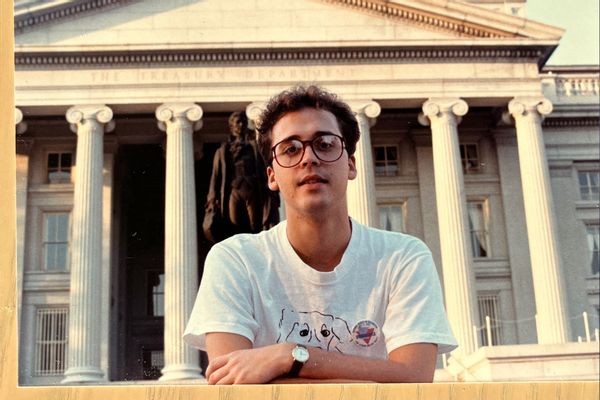 Jim Berg (author) in front of the Supreme Court on the weekend of the March, 1987 (Photo courtesy of the author)
Jim Berg (author) in front of the Supreme Court on the weekend of the March, 1987 (Photo courtesy of the author)Just before Christmas in 1987, Geraldo Rivera outed me on national television. I'm sure it wasn't malicious, even though he has a history of shock journalism. He didn't even know my name. During a primetime special, he showed a video clip of me and my boyfriend kissing on the National Mall, taken during the National March on Washington for Gay and Lesbian Rights.
I think about this often during Pride Month, even though it happened more than 30 years and several boyfriends ago. The broadcast caused a scandal in my family because I wasn't out to them. In fact, they knew very little about my life. Read the essay by Jim Berg.
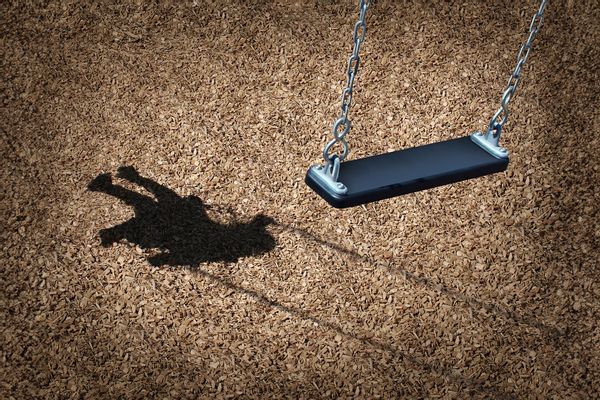 Missing child concept with an empty playground swing and the shadow of a little girl on the park ground (Getty Images/wildpixel)
Missing child concept with an empty playground swing and the shadow of a little girl on the park ground (Getty Images/wildpixel)In 2004 my daughters, ages 4 and 7 at the time, disappeared during the Christmas parade downtown.
They were riding on a float. A late afternoon in early December. Greensboro, North Carolina, a city of 300,000. The streets packed with parents and children and police cars, the parade route blocked off. The big buildings creating a canyon in which sound magnified, all the calls and car backfires amplified.
At the staging area my wife Lisa and I watched our daughters loaded onto the float with the other children, their legs swinging back and forth where they dangled over the edge. Lisa snapping pictures and waving and turning to tell me how cute they looked sitting among the snow and fake packages on the Christmas float. Read the essay by Paul Crenshaw.
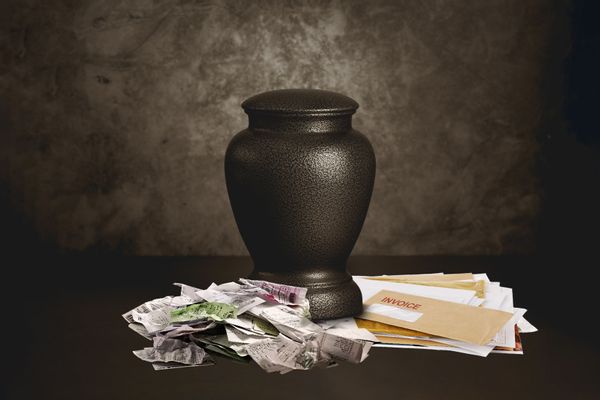 An urn, some receipts and invoice letters (Photo illustration by Salon/Getty Images)
An urn, some receipts and invoice letters (Photo illustration by Salon/Getty Images)Lately the Grim Reaper and I have grown so close we might as well exchange friendship bracelets. My mom — therapist, beachgoer, "Jeopardy!" fan — died of liver disease in 2020. In 2023, my dad — architect, golfer, ABBA fan — died of pancreatic cancer. I'm 35 years old, smack dab in the middle of the Millennial generation, and grief is the least of my problems. What I'm really struggling with is the legal and financial aftermath.
In the days before my dad died, the hospital was already asking me to make major financial decisions. What funeral home or crematorium do you want to use? Do you really want the basic package? Was your beloved father basic? Read the essay by Becky Robison.
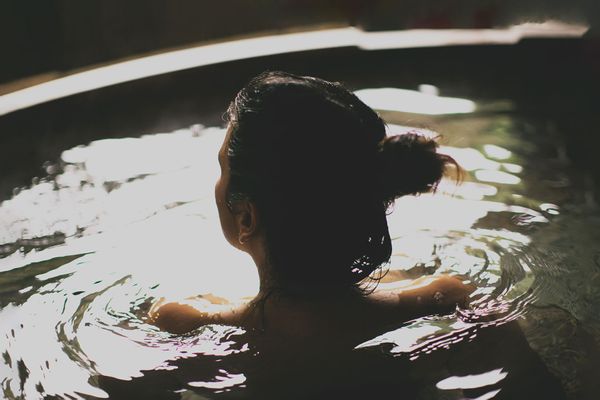 Woman bathing in a hot spring (Getty Images/Jesus Sierra)
Woman bathing in a hot spring (Getty Images/Jesus Sierra)It was easy getting dressed that morning, knowing that at my destination, I'd spend most of my time naked. From the parking lot, Olympic Spa — the prominent, women-only Korean spa in Los Angeles — looked surprisingly utilitarian. In sweats and a T-shirt, I walked into the building alone and early, ahead of the two friends I would be meeting. We had discussed ahead of time what to expect in a space where nudity was the norm — namely, who was going to shave and how much, and who was going to let the hair down there flow. "I'm going full beast," my one friend said, and I agreed to do the same. Read the essay by Avni Shah.
Read more
engaging Life Stories from 2023:


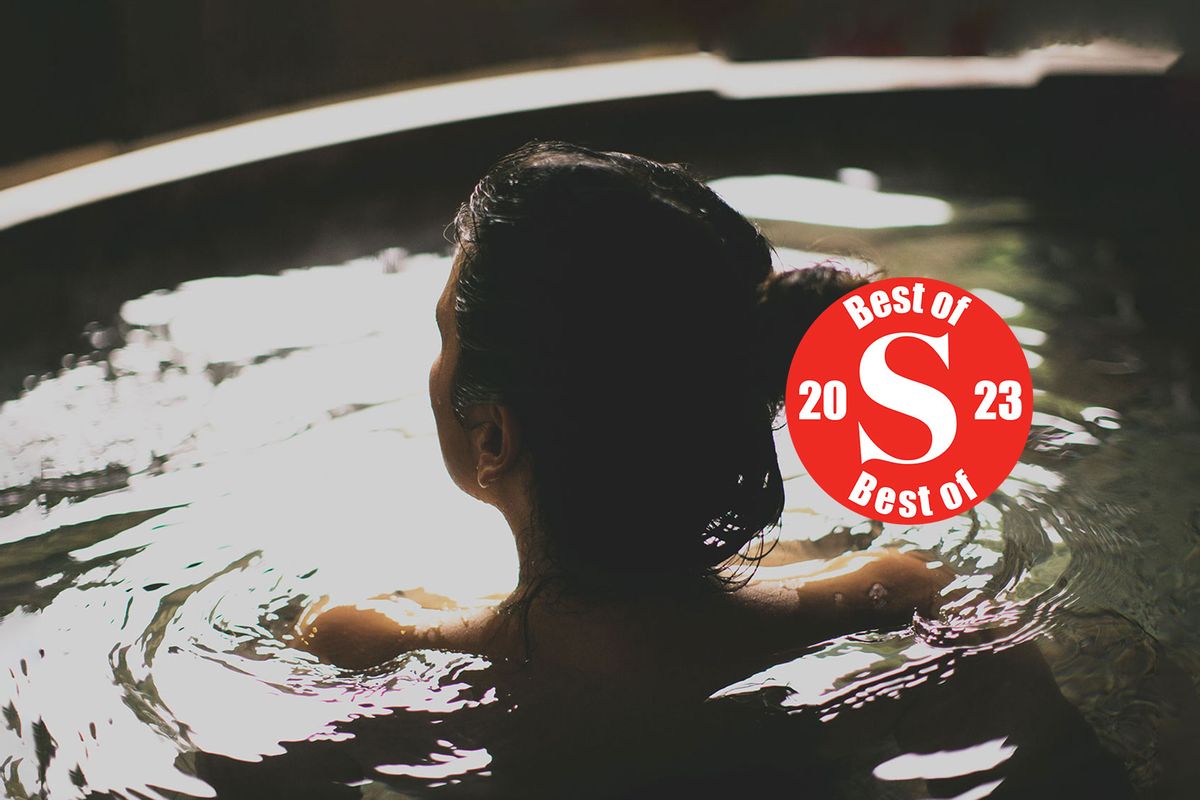
Shares